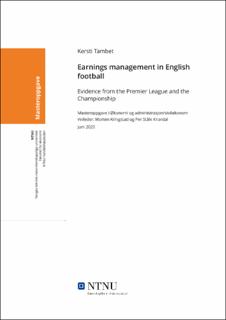| dc.contributor.advisor | Kringstad, Morten | |
| dc.contributor.advisor | Knardal, Per Ståle | |
| dc.contributor.author | Tambet, Kersti | |
| dc.date.accessioned | 2021-09-14T17:15:11Z | |
| dc.date.available | 2021-09-14T17:15:11Z | |
| dc.date.issued | 2020 | |
| dc.identifier | no.ntnu:inspera:55685018:60182068 | |
| dc.identifier.uri | https://hdl.handle.net/11250/2777154 | |
| dc.description.abstract | Formålet med den oppgaven er å undersøke om engelske fotballklubber i to øverste driver med earnings management. Earnings management er definert som ledelses bevisste valg innen regnskapsregelverket eller gjennomføring av reelle økonomiske transaksjoner for å forbedre resultat («real earnings management»). Begrepet «earnings management» omfatter altså bevisste regnskapsvalg av ledelsen, men ikke de utilsiktede feil i regnskapet eller regnskapsmanipulasjon.
Det er aktuelt å studere earnings management i de engelske fotballklubber fordi fotballmyndigheter baserer sine finansielle kontroller av fotballklubber på regnskapsinformasjon. Tidligere forskning tyder på at regnskapskvaliteten forringes når det er regulatoriske kontroller knyttet til regnskapsinformasjon. For eksempel, fotballklubber i elitedivisjoner i Europa drev med mer earnings management etter implementering av «Financial Fair Play (FFP)» regelverket.
Utvalget besto av 28 fotballklubber fra de to øverste divisjonene i England (Premier League og Championship). Årsregnskapene til fotballklubber fra den 2011-12 sesongen til den 2017-18 sesongen ble brukt som datakilde, samt Orbis-databasen. To metoder ble brukt for å avdekke earnings management: resultatutjevning («income smoothing») og anormale periodiseringer («accrual management»). Resultater tyder på at engelske fotballklubber driver med earnings management, men det er ikke signifikante forskjeller mellom de to ligaene. Klubber med høyere ratio lønn vs. inntekter driver mer med earnings management. Det forklares ved at klubber er ikke profittmaksimerende, men de er heller vinnmaksimerende. Lønnskostnader er positivt relatert til sportslig suksess. Fotballklubber må oppnå to motstridende mål (sportslig og finansielt). Det kan føre til at fotballklubber tilfredsstiller alle stakeholdere på bekostning av regnskapskvalitet.
Denne studien bidrar til eksisterende forsking på tre måter: den studerer earnings management i ett lands fotballigaer, den inkluderer klubber fra lavere divisjoner i utvalget, og den tester to nye hypoteser (om ligatilhørighet eller ratio lønn/inntekter påvirker earnings management i engelske fotballklubber). | |
| dc.description.abstract | The thesis studies whether football clubs in the two highest divisions in the English league system engage in earnings management. Earnings management is defined as management’s discretion over accounting choices or real economic transactions to present a desired picture of the company’s financial performance and position. The term covers the intentional choices of management, but not unintentional errors, or illegal manipulations.
To study the earnings management activities in English football clubs is relevant because the monitoring of clubs’ finances by regulatory organs is tied to the accounting data. The existing literature on earnings management demonstrates that the accounting quality deteriorates when regulatory control is tied to accounting data. Previous research has found out that the clubs in the elite divisions in Europe managed their earnings more after the implementation of the FFP rules than before.
Total of 28 football clubs from the two top divisions in England – the Premier League and Championship – were used in the study. The period was seven seasons from the 2011-12 to the 2017-18 season. Data was collected from the Orbis database and manually from the clubs’ annual financial reports. Two proxies of earnings management were used to evaluate earnings management: income smoothing and accrual management. Results indicate that English football clubs engage in earnings management, although there are no significant differences between the two leagues. Clubs with higher wages to revenues ratio engage more in earnings management. Football clubs are win maximisers, and the wage expenditure is related to footballing success. Therefore, the results indicate that the clubs may sacrifice the accounting quality to satisfy two contradictory objectives: the sporting success and the financial rules imposed by the regulatory organs.
The study is novel in three ways. Firstly, earnings management is analysed in one country’s football leagues. Secondly, the sample includes clubs that participate in the lower leagues. Thirdly, the study employs two novel hypotheses: whether the clubs in the lower leagues engage more in earnings management and the effect of wage costs on the discretionary accruals. | |
| dc.language | | |
| dc.publisher | NTNU | |
| dc.title | Earnings management in English football: evidence from the Premier League and the Championship | |
| dc.type | Master thesis | |
